Brussels – A very quick, even though not formal, decision was expected, with a solid draft of EU appointments on which the decision of the 27 member states would pass without hesitation next week at the European Council. However, in the end, there was no decision, but after all – as the President of the European Council, Charles Michel, stressed speaking to the press at the end of the June 17 informal summit – “it was absolutely clear from the beginning, and it is not a surprise, that the goal today was not to make a decision.” If only for the fact that “it would have implied something different in terms of the legal process, which is instead scheduled for next week” at the informal meeting on June 27-28.
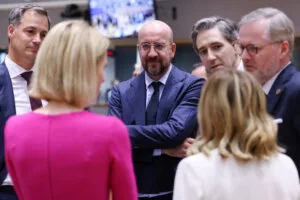
In short, the decision on the package of EU appointments to divide among European parties the highest offices in the Union institutions – presidency of the Commission, Council, Parliament, and EU High Representative – was wishful thinking. Patience is needed. The work of negotiators continues. It will be necessary to wait. But “the goal was to prepare the ground for next week with a thorough and transparent exchange of views,” Michel made clear, leaving only between the lines that neither he nor the heads of state and government of the 27 member countries want a hasty and improvised decision, however quick to respond without hesitation to an uncertain and threatening global context. “The European Council is an important institution, and we have to make sure that in the future it is able to ensure as much as possible the unity of the European Union,” the current President said, who recalled the words with which his predecessor had passed the baton to him in 2019: “Five years ago, Donald Tusk gave me very good advice, to make sure that we work to protect the unity of the European Union and the European Council.”
However, the Council’s number one did not want to hide that the ambition and the 27 Member State’s “collective duty” remains to “make a decision on the institutional cycle by the end of June,” thus the summit next Thursday and Friday. But if the decision converges on the EU nomination package that has been circulating for a week in Brussels – Ursula von der Leyen and Roberta Metsola for confirmation to the Commission and Parliament, respectively, Portugal’s former prime minister, António Costa, to the European Council, and the Estonian premier, Kaja Kallas, as EU High Representative for Foreign Affairs and Security Policy -“we will only clarify this next week” because today was “an important step” in preparing for the formal meeting that will have to give the final green light.
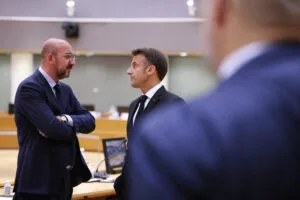
Michel strongly insisted that “it is important to ensure the transparency and inclusiveness of the decision-making process because all 27 leaders must feel involved” to arrive “as soon as possible” at a green light on EU appointments next week, as well as on the strategic agenda “on which we have started working since the Granada summit.” However, the focus is inevitably all on the so-called top jobs – the top posts in the Union’s main institutions – that the different European political parties and their representatives at the government level are jockeying for at the European Council table: “It is a special moment because there is a line from each party according to the results of the European elections,” Michel explained, stressing that each political family has presented “its own proposals” and from there “we have started the decision-making process.”
The political games between parties and governments
For better or worse, one must look to the European parties. While there are the political lines that could enable a quick agreement, there are also ambitions that, at the same time, risk blowing it up. An example is the European People’s Party (EPP), which reportedly proposed applying the two-and-a-half-year relay to the Presidency of the European Council, like the EU Parliament. In other words, the Socialist Costa – whose position seems to be “consolidated,” sources confirm – should give way to a Popular at the end of the first term — the end of 2026/beginning of 2027. The mandate of the President of the European Council lasts two and a half years, but since becoming the elective office in 2009, it always has been renewed for five years. If the all-in succeeds, the EPP for the entire legislature could secure two out of four top posts (Commission plus Parliament and rotating Council). Otherwise, it will be an equal split with the Party of European Socialists (which would have both Council and Parliament from 2027).
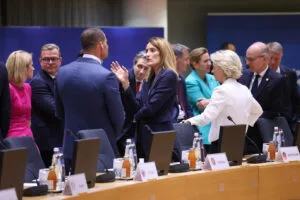
The first confrontation between negotiators from the three European parties that will form the parliamentary majority–Populars, Social Democrats, and Liberals–was held before the informal summit to gauge the mood of their respective counterparts. Meanwhile, Metsola disclosed that she has submitted her candidacy to succeed herself as head of the EU Parliament and that the European Parliament “is ready to vote” to confirm the European Council’s choice for the Commission Presidency. With this in mind, Metsola invited Michel to attend the next meetings of the Conference of Group Presidents scheduled for June 20-26 as consultations before the hoped-for final decision at the June 27-28 summit. Should there be an agreement at the European Council, there can be an initial “exchange of views” between the group leaders and the Commission Presidential candidate “at the July 2 meeting” before the EU Parliament plenary on July 16-19 in Strasbourg.
Coming out of the informal summit, French President Emmanuel Macron remained vague about not wanting to be “overly optimistic,” but an agreement “is close.”The Dutch premier, Mark Rutte, confirmed that EU leaders have been talking about the names in the package after the European elections and, although there has been no agreement, “the situation seems clearer than in 2019 when there was a big lottery for three days.” Croatia’s Andrej Plenković also assured that “I don’t see any voices” at the European Council table that could “cast doubt” on von der Leyen’s name, on which Prime Ministers from the European People’s Party family are also converging: Greece’s Kyriakos Mītsotakīs, Spain’s Alberto Núñez Feijóo, Ireland’s Simon Harris, and Portugal’s Luís Montenegro (who also supports Costa’s nomination to the European Council, as “in the broader context of the European project, our parties are generally aligned”) and Poland’s Donald Tusk, who cut out of the majority in the EU Parliament the Italian Premier and President of the European Conservatives and Reformists Party (ECR), Giorgia Meloni.
The package of EU appointments on the table of the Twenty-seven
The European People’s Party already confirmed that, after the convincing electoral test of the national parties affiliated with the EPP, they expect to obtain both the Presidency of the Commission and that of the first two-and-a-half-year “round” of Parliament in perfect continuity with the end of the ninth legislature, also in terms of the names: Germany’s von der Leyen and Malta’s Metsola, respectively. For the Commission, currently, there do not appear to be any credible alternatives for the leadership of the Union’s executive, although von der Leyen must guard against the political uncertainty in several capitals after the European elections. For the Presidency of the European Parliament, the leading name is still Metsola, who has been head of the EU institution since January 2022, and the likely election is expected to come at the inaugural plenary session of the tenth legislature between July 16 and 19. F or the passing of the baton between Popular and Social Democrats to the presidency of the EU Parliament over the next five-year legislature, several sources in the two groups warn that it is still a premature issue and will depend on the distribution of posts in the other EU institutions.
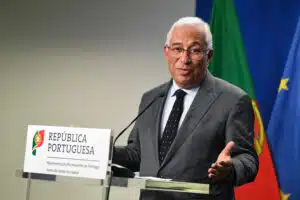
European Socialists are betting all their cards on the next presidency of the European Council, having reconfirmed themselves as the second force in the European Parliament and limiting the risk of hemorrhaging votes. The European Socialists remain the unavoidable partner for the Populars in the centrist majority in the EU Parliament, which is why, given the parallel collapse of the Liberals, they are now aiming for more than just the EU high representative (as they have in the last two terms). The clear favorite is Portugal’s former Premier Costa, considering that in other capitals, the investigation over alleged corruption that forced his resignation in November 2023 is not considered a problem, even if it does not concern him personally.
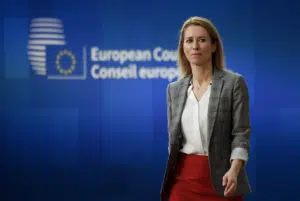
Last but not least, there is the final post at stake after the European elections, which, in the logic of partitioning the EU institutions’ top leadership between parties, should be claimed by the Liberals. In pole position for the post of EU High Representative for Foreign Affairs and Security Policy is the current Estonian PM Kallas, who, since February 24, 2022, has carved out the role of irreproachable leader at the side of Ukraine after it was invaded by Russia, among the most determined at the table of the 27 EU leaders. It is the element that could earn the Estonian premier a promotion to head the Union’s foreign policy as a statement of support for Kyiv that, after more than two years, is not likely to wane from Brussels.
English version by the Translation Service of Withub
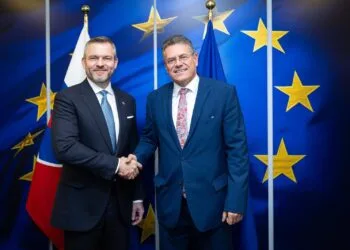
![Il ministro degli Esteri e vicepresidente del Ppe, Antonio Tajani [Bruxelles, 17 giugno 2024. Foto: Emanuele Bonini]](https://www.eunews.it/wp-content/uploads/2024/06/tajani-epp-350x250.png.webp)




![[foto: imagoeconomica]](https://www.eunews.it/wp-content/uploads/2023/09/Imagoeconomica_1917240-scaled.jpg.webp)


